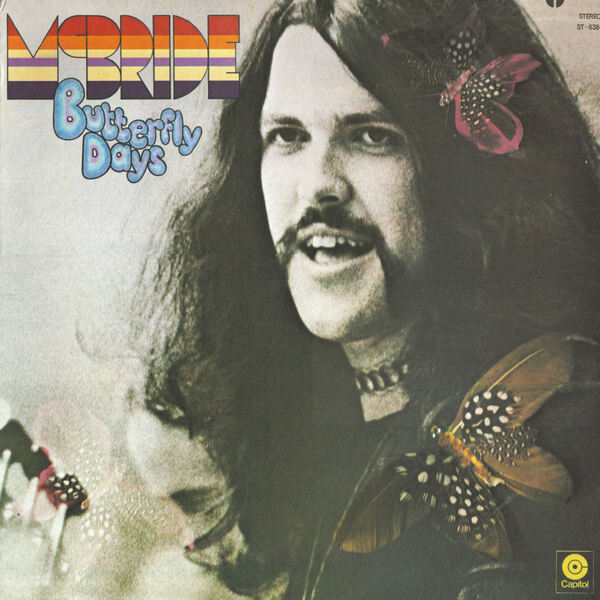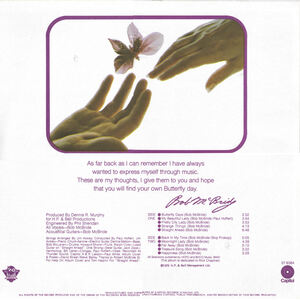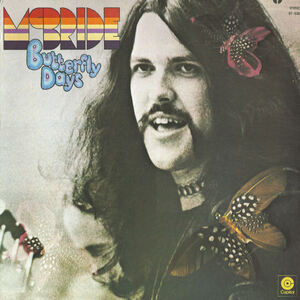Information/Write-up
As far back as I can remember I have always wanted to express myself through music. These are my thoughts, I give them to you and hope that you will find your own Butterfly day.
-Bob McBride
(November 17, 1946 – February 20, 1998)
Bob McBride was a Canadian singer and songwriter best known as the lead vocalist for the chart-topping jazz-rock ensemble Lighthouse, and later as a solo artist whose soulful voice and emotional intensity left a lasting impression on Canadian music.
Born in Toronto, Ontario, McBride began formal voice lessons at a young age and learned guitar while attending North Toronto Collegiate Institute. After performing in a number of short-lived groups, he rose to national prominence in 1970 when he replaced Pinky Dauvin as the frontman for Lighthouse. His commanding tenor voice was immediately central to the band’s identity, helping propel hits like “One Fine Morning,” “1849,” “Take It Slow,” “Sunny Days,” and “Hats Off to the Stranger” up the charts. He performed with the group during their appearance at the 1970 Isle of Wight Festival, sharing a stage with Jimi Hendrix, and was part of their 1972 Juno Award win for Outstanding Performance by a Group.
McBride launched his solo career later that same year, signing with Capitol Records and releasing his debut LP Butterfly Days (1972). The album showcased his skillful songwriting and featured Chuck Aarons, Paul Hoffert, and others. It produced three singles—“Treasure Song,” “Pretty City Lady,” and the title track—and was certified gold in Canada. His success was further cemented when he won the 1973 Juno Award for Outstanding Male Performance.
In 1973, creative tensions culminated in McBride’s dismissal from Lighthouse after he missed key sessions for their album Can You Feel It. Though originally slated to sing lead on “Pretty Lady,” the vocal was recorded instead by Skip Prokop, who later stated McBride could have “done it bigger and better.”
McBride quickly returned to the studio to complete his second solo LP, Sea of Dreams (1973), once again produced by Dennis R. Murphy. The album features powerful songwriting and magical orchestrations, with contributions from his brother Danny McBride, pianist and arranger Jim Ackley, and guitarist Chuck Aarons. Although it followed closely on the heels of Butterfly Days, Sea of Dreams did not match the commercial performance of its predecessor. McBride’s contract with Capitol Records ended shortly thereafter.
After several years of limited activity, McBride signed with MCA Records and released his third solo album, Here to Sing (1978), featuring arrangements by Paul Hoffert and production by Jack Richardson. Despite strong musicianship” the album failed to chart. He followed it with a self-titled live album, Bob McBride (1979), recorded at the RPM Conference at Toronto’s Inn on the Park and released on Aurora Meadows Productions.
In 1982, McBride reunited with Lighthouse for a successful four-show engagement at Ontario Place, drawing over 30,000 fans. But his personal struggles began to overshadow his professional life. Battling heroin addiction, McBride’s performances became inconsistent, and by 1992—despite rejoining Lighthouse for another reunion—he was again forced out due to erratic behaviour and declining health.
By the mid-1990s, McBride’s life had unraveled. He attempted to rob an Ottawa pharmacy for morphine in 1994 and was later charged with a jewelry theft while reportedly trying to stay clean. In 1996, McBride was attacked during a home invasion at his parents’ house, sustaining severe head injuries. He never fully recovered and died of heart failure on February 20, 1998 at North York General Hospital. He was 51.
Despite personal hardship, Bob McBride’s recorded legacy reflects a vocalist of rare power and sensitivity—one who helped define a generation of Canadian rock and left behind four deeply personal and musically rich solo albums.
-Robert Williston
Bob McBride: vocals, acoustic guitar
Chuck Aarons: electric guitar
Dennis Melton: bass
Bob McLaren: drums
Ollie Strong: steel guitar
Ralph Cole: lead guitar on 'Straight Ahead'
Jim Ackley: piano
Paul Hoffert: vibraphone
Bill Usher: congas
Howard Shore: flute
Jack Zaza: harmonica
Written by Bob Mcbride except 'My Beautiful Lady' written by Bob McBride and Paul Hoffert; and 'Back in My Time written by Bob McBride and Skip Prokop
Strings arranged by Jim Ackley
Conducted by Paul Hoffert
Produced by Dennis R. Murphy for H.P. & Bell Productions
Engineered by Phil Sheridan
Recorded at Thunder Sound, Toronto, Ontario
Capitol A&R liaison: Paul White
Album cover and poster artwork by David Street and Steve Bailey
Thanks to Robert McBride Sr. for help on album cover and Tom Halprin for 'Straight Ahead'
Some copies were issued with 24" x 36" full color poster similar to front cover of LP with heading "After All Butterflies Only Come Out On Nice Days"
This album is dedicated to Rick Chapman



No Comments